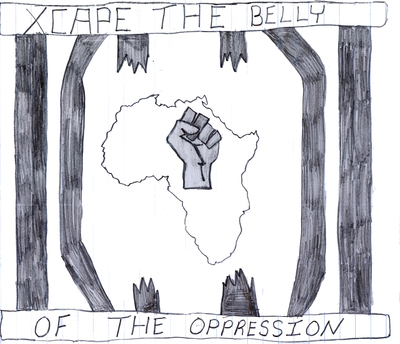
Terminology Debate: Black vs. New Afrikan

The African continent has long been a symbol of Black nationalism in
the United $tates.
However, New Afrika is named such because it is a
new nation with its own territory
within the United $tates. We must
combat cultural nationalism, which does not address the
need to
liberate this new nation here and now.
MIM took up this question of the terms “Black” and “New African” back in
2001 in
MIM
Theory 14 when it published a letter from a RAIL comrade (RC)
proposing use of “New African.” In that letter, the RC proposed that
“Use of the term New African is waging ideological struggle to establish
a national identity.” S/he goes on to explain that “New African implies
the identity of a national territory - the Republic of New Africa” while
the term “Black” “cannot and will not be distinguished from
integrationist, assimilationist, and other petty bourgeois reactionary
agendas.” MIM responded to this pointing out that the term
“African-American” has emerged to distinguish the petty bourgeois
integrationists. MIM’s main complaint with the term “New African” was
cultural nationalism:
“What makes including the word ‘African’ in the term relevant? Culture. That is, it is not the land in Africa that makes Blacks in North America a nation, nor the economy, language, and so on. It is the cultural history that survived the genocidal purges of the Middle Passage and slavery that links Blacks to a historical African culture. This is completely true, and this connection is obviously important. However, for the definition of the nation it plays into cultural nationalism to give this aspect too prominent a role. In fact, as MIM has argued, this term has been used most often by people with cultural nationalist tendencies. All the arguments for stressing the African link are cultural, and therefore the tendency of this term is toward cultural nationalism, which is a serious danger from the petty bourgeoisie and comprador bourgeoisie as well.”(2)
MIM(Prisons) has researched the use of the term “New Afrikan” and concluded that while there may be cultural nationalism associated historically with some who use the term, overall today it is being used by the most progressive elements of the revolutionary nationalist movement within the United $tates. While we have some reservations about the ties to Africa promoted by some, we have concluded that “New Afrikan” is a better term to represent the Black nation than “Black,” which has strong racial connotations and is generally not associated with a nation. “New Afrikan” is a term specific to the historical context of African-descended people in North America and so better represents our line on this oppressed nation within U.$. borders.
Black Order Revolutionary Organization (BORO), New Afrikan Maoist Party (NAMP), New Afrikan Black Panther Party (NABPP), New Afrikan Collective Think Tank (NCTT) and the New Afrikan Independence Movement (NAIM) all use the term “New Afrikan.” Except for NAIM, these are all prison-based organizations. NAIM was the progenitor of the term “New Afrikan.”
NAIM has written: “to call oneself New Afrikan, at this early stage, is to be, by and large, about what We in the NAIM are about: Land, Independence and Socialism.” They lay claim to the term: “We are the ones who led the ideological struggle for the usage of New Afrikan as our national identity (nationality) over ‘black’ as a racial identity.”(1)
One argument NAIM uses for the term New Afrikan is: “…colonized Afrikans, who evolved into New Afrikans here, were stolen to be used as a permanent proletariat. The New Afrikan nation was born as a working-class nation of permanent proletarians. The fact that We weren’t paid does not preclude the fact that We were workers. What do they think so-called ‘slavery’ (colonialism) entails if not work?”(1)
On this last point, MIM(Prisons) disagrees that New Afrikans are a permanent proletariat. As MIM laid out and we continue to expand on, the vast majority of U.$. citizens are part of the labor aristocracy, not the proletariat. This does not necessarily negate the use of the term “New Afrikan,” but we want to be clear where we differ with NAIM on the class makeup of the nation today.
The NABPP promotes Pan-Afrikanism, promoting the common interests of the various oppressed nations of Africa and extending it to the so-called African diaspora of New Afrikans in the United $tates and other imperialist countries. This is one of the pitfalls of the term New Afrikan: it can lead people to associate imperialist-country Blacks with the oppressed nations of Africa. While most Blacks were originally brought over as slaves and certainly were strongly connected to their home continent at first, we see a very distinct oppressed nation that has developed within U.$. borders in the hundreds of years since the slaves were first forced to North America.
We do not use the term “New Afrikan” to promote pan-Africanism among U.$.-resident peoples. New Afrikans have historical ties to Africa, but today New Afrikans have far more in common with, and are more strongly connected to, other nations within U.$. borders. New Afrikans are closer to Amerikans in economic interests and national identity than they are to Egyptians or Somalis, and will certainly lead any pan-African movement astray and likely sell out the African oppressed nations.
We have not seen a clear rationale for the distinction between “New African” and “New Afrikan,” but some use the letter “k” in “Afrika” to distinguish themselves from the colonial spelling. According to a writer in MIM Theory 14, the term “New Afrikan” originated in 1968 when the First New Afrikan government conference was held by the PGRNA (Provisional Government of the Republic of New Afrika).(3) We have adopted this spelling, as it is used by the progressive elements of the nation, but welcome input on the relevance of this spelling distinction.
Related Articles:This article referenced in:








